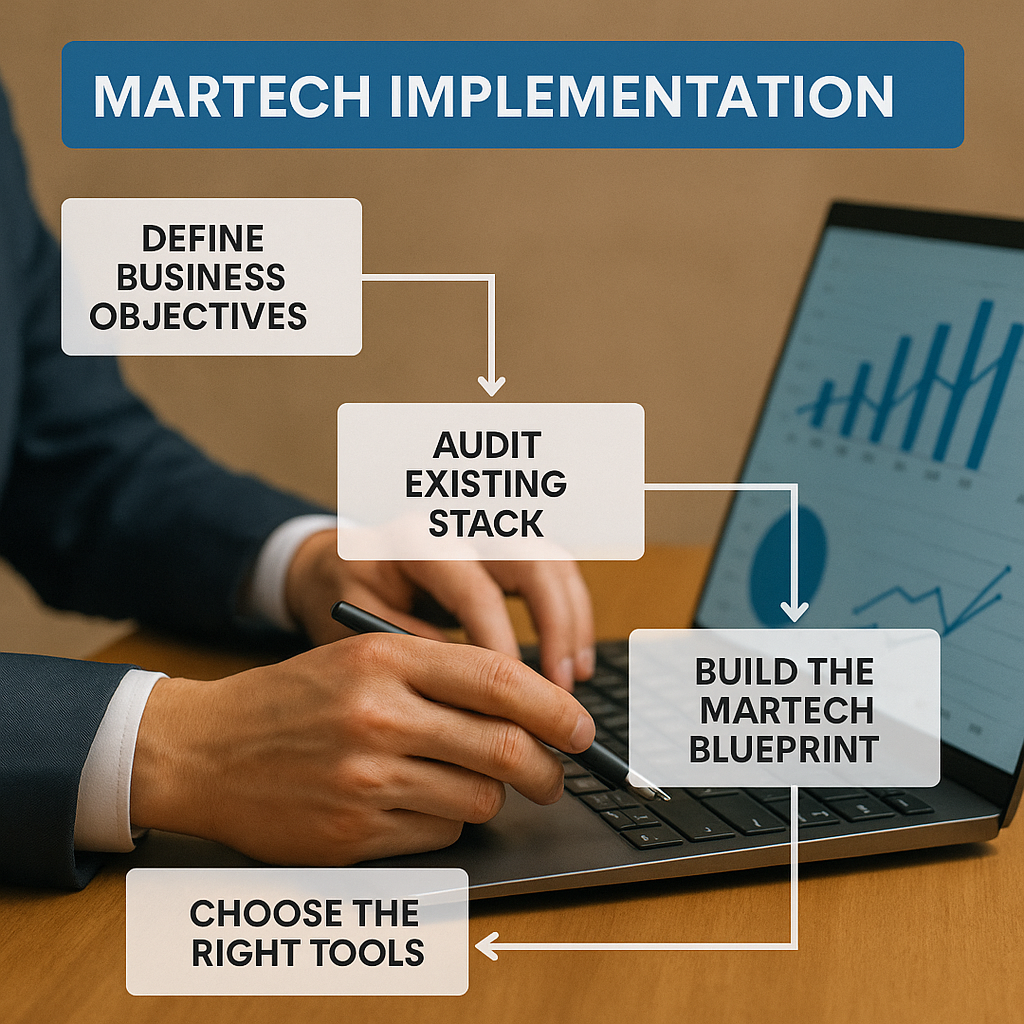
How and What Powers MarTech Implementation for Business Success
In today’s data-driven economy, the convergence of marketing and technology, known as Martech, has evolved from a trend to a strategic necessity. Martech implementation refers to the structured integration of marketing technologies into an organization’s ecosystem to improve processes, enhance customer experiences, and boost return on investment (ROI).
The journey of martech implementation is not just about buying software or tools; it’s about embedding digital capabilities that align with business goals. Whether you’re a startup seeking agility or an enterprise navigating scale, martech lays the digital foundation for marketing excellence.
Organizations that implement martech effectively gain the ability to automate tasks, personalize messaging at scale, analyze data in real time, and optimize cross-channel campaigns. As a result, companies achieve faster decision-making, improved lead quality, and better customer lifecycle management.
What Is Martech Implementation and Why Does It Matter
At its core, martech implementation is the strategic deployment of digital platforms, tools, and analytics systems that empower marketing functions. These include CRM systems, email marketing software, customer journey automation, content management, social media analytics, and AI-based personalization engines.
The Need for Martech Implementation
Marketing departments are no longer measured just by brand awareness but by quantifiable business impact. Here’s why martech has become indispensable:
- Customer-Centricity: Customers expect hyper-personalized, seamless experiences across digital channels. Martech enables you to deliver.
- Operational Efficiency: Automation reduces human error and accelerates marketing execution.
- Data Utilization: Real-time analytics improve campaign agility, segmentation, and ROI measurement.
- Competitive Advantage: Companies that adopt martech early gain insights faster and respond better to market trends.
This isn’t just about efficiency, it’s about survival. As buyer behavior shifts and digital channels multiply, businesses without a structured martech strategy risk falling behind.
Who Should Drive Martech Implementation?
The success of any martech implementation hinges on a cohesive alliance between marketing, IT, and leadership teams. It is not just a technical project or a marketing initiative; it’s a business transformation.
Key Stakeholders Include:
- CMOs & Marketing Leaders: Define strategic goals, customer journey maps, and KPIs.
- CTOs & IT Teams: Ensure system compatibility, cybersecurity, and scalability.
- Data Analysts: Translate raw data into actionable insights.
- Sales Teams: Use martech to track and qualify leads.
- External Consultants or Vendors: Guide platform selection and implementation best practices.
True martech success occurs when these stakeholders align on goals, processes, and timelines, driving both innovation and accountability.
When Is the Right Time to Implement Martech?
Timing can define success. While there’s no one-size-fits-all answer, these are telltale signs your business is ready:
- Rapid growth causing misalignment between marketing and operations.
- Declining campaign performance despite increased effort or budget.
- Low visibility into marketing attribution or customer insights.
- Siloed teams and tools leading to duplicated efforts and inconsistent messaging.
- Desire to move from manual, repetitive tasks to intelligent automation.
Ideally, martech implementation should begin before digital maturity becomes an issue. Proactive adoption positions your business for scalability and resilience.
Where Martech Implementation Makes the Most Impact
Martech touches every aspect of modern marketing, from content to conversion, and has transformative effects across industries. Below are key business areas where it delivers maximum value:
- Customer Experience and Engagement
Martech enables omnichannel engagement strategies that are consistent and personalized. With the right setup, a user’s email, social media interaction, and website behavior can all feed into one seamless journey. - Campaign Management
Automated workflows streamline campaign creation, targeting, testing, and reporting. Platforms like customer journey builders and A/B testing tools empower marketers to fine-tune messaging in real time. - Lead Generation and Nurturing
By integrating CRM with marketing automation platforms, businesses can capture, score, and nurture leads more effectively, reducing sales cycles and increasing conversions. - Data-Driven Decision Making
Martech provides dashboards and predictive analytics, helping teams make fast, informed decisions based on real-time behavior and market trends. - Compliance and Data Privacy
With built-in features to manage GDPR, CCPA, and other compliance frameworks, martech tools minimize legal risks while preserving customer trust.
Practical Role Across Industry Verticals
In Healthcare:
Martech supports patient outreach, appointment reminders, and targeted wellness campaigns through HIPAA-compliant platforms. It improves health literacy and patient retention with content personalization.
In Construction:
It streamlines lead nurturing, bid tracking, and project marketing, allowing construction firms to build stronger client pipelines and manage complex stakeholder relationships digitally.
In Technology:
Tech companies use martech to power complex product launches, manage SaaS lifecycles, and track user behavior through analytics platforms, ensuring product-market fit and faster adoption.
Advantages of Martech Implementation
The value of implementing a strong martech stack goes beyond tools, it’s about strategic growth. Key benefits include:
| Benefit | Description |
|---|---|
| Increased ROI | Allocate budget efficiently and prove marketing value with data. |
| Scalability | Grow your marketing efforts without linear increases in cost. |
| Speed to Market | Automate repetitive tasks and launch faster. |
| Improved Customer Insight | Collect and analyze user behavior to refine targeting. |
| Cross-Team Collaboration | Centralized data and platforms foster collaboration between marketing, sales, and product teams. |
Steps to Successful Martech Implementation
A well-orchestrated martech implementation strategy involves multiple steps that go beyond the technical installation of software.
Step 1: Define Business Objectives
Align martech goals with business outcomes. Focus on measurable KPIs, whether it’s increasing MQLs, improving NPS, or reducing churn.
Step 2: Audit Existing Stack
Identify what’s already in use, what overlaps, and what gaps exist in your current technology.
Step 3: Build the Martech Blueprint
Design a scalable architecture that includes tools for CRM, CMS, analytics, automation, and data management platforms.
Step 4: Choose the Right Tools
Select platforms based on ease of integration, user-friendliness, scalability, and support.
Step 5: Train and Onboard Teams
Ensure internal users understand how to use the tools. Offer training sessions, documentation, and ongoing support.
Step 6: Test, Optimize, and Iterate
Measure the performance of tools and processes. Refine workflows based on results and evolving needs.

Challenges and Considerations
While the benefits are clear, martech implementation is not without its hurdles:
- Change Management Resistance: Staff may resist switching from familiar processes.
- Data Silos: Integration challenges can prevent systems from communicating effectively.
- Overwhelming Tool Choices: The martech landscape is vast and constantly evolving.
- Lack of Skilled Talent: Implementation demands cross-functional expertise.
Solving these challenges requires a thoughtful roadmap, stakeholder buy-in, and agile execution.
Conclusion: The Long-Term Value of Martech Implementation
Martech implementation is more than a digital upgrade; it is a strategic evolution that transforms how businesses understand, engage, and grow with their customers. When thoughtfully planned and executed, it becomes the engine that powers data-driven innovation, operational excellence, and sustainable competitive advantage.
Companies that embrace martech early position themselves not just to compete but to lead in a digital-first world. With ever-increasing consumer expectations, the organizations that deliver personalized, timely, and relevant experiences will be the ones that thrive.
For expert martech implementation tailored to your industry, contact Product Siddha at +91 98993 22826 and unlock your business’s digital potential today.
